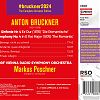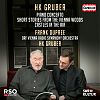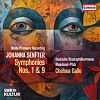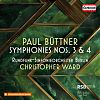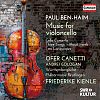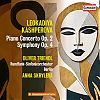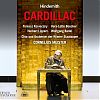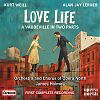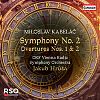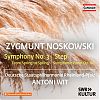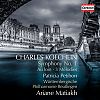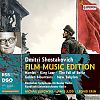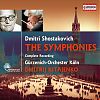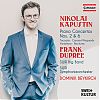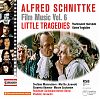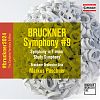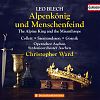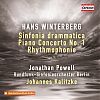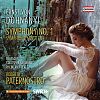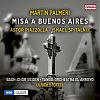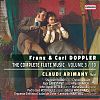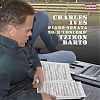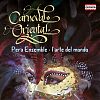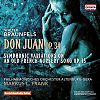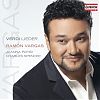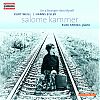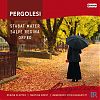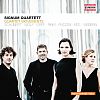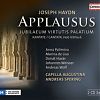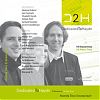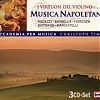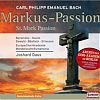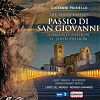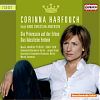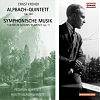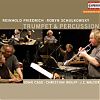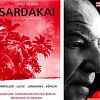cd

NINO ROTA
Peristerakis · Sobol · WDR Funkhausorchester Köln · FELIX BENDER, MICHAEL SEAL, conductor
When Toscanini encouraged Nino Rota to study at the Curtis Institute, where instructions by Fritz Reiner and a friendship with Aaron Copland awaited the precocious composer, it was already clear he would have a massive career. Only the direction wasn’t certain yet. It turned out to be classical music and film music, the former informing the latter. Notable when you listen to the delicious waltz Rota from War & Peace or the darkly humorous snippets from the very apropos Orchestra Rehearsal. And while the de-facto horn concertino Castel del Monte, inspired by King Frederick II’s famous medieval castle in southern Italy, isn’t technically film music, it very much sounds like music to a fantasy film of Rota’s imagining.
Hörprobe
Weitere Bilder

#bruckner24 Symphony #4 (1876) 'Romantic'
ORF VIENNA RADIO SYMPHONY ORCHESTRA · MARKUS POSCHNER
This Complete Versions Edition includes all versions published or to be published under the auspices of the Austrian National Library and the International Bruckner Society in the Neue Anton Bruckner Gesamtausgabe (The New Anton Bruckner Complete Edition)
Continuing their survey of all of Anton Bruckner’s symphonies in each and every one of their various versions, Markus Poschner and his team now tackle the original 1876 version of Bruckner’s arguably most popular symphony, the Fourth. “1876? Surely you mean 1874!” might the Bruckner-maven go. Well, actually, recent research has brought to light that Bruckner was still fiddling around with his first go at that work, but not so substantially that the changes amounted to a separate version or, for that matter, the 1878 second “standard” version. Paul Hawkshaw’s liner notes detail all the differences if you’re interested – but of course, one can also just enjoy the raw and fresh music of Bruckner’s expansive first ideas.
Youtube
Weitere Bilder

#bruckner24 Symphony #8 (1887)
BRUCKNER ORCHESTER LINZ · MARKUS POSCHNER
This Complete Versions Edition includes all versions published or to be published under the auspices of the Austrian National Library and the International Bruckner Society in the Neue Anton Bruckner Gesamtausgabe (The New Anton Bruckner Complete Edition).
Was it a sign of conductors’ general satisfaction with Bruckner’s Eighth Symphony or editorial foot-dragging, that the work’s original 1887 version wasn’t published and performed until 1972? It certainly was Hermann Levi’s dissatisfaction or at least discombobulation with it, so shortly after his very successful Munich performance of the Seventh, that made Bruckner revise the work in the first place. It is this elaborate, raw earlier version that Markus Poschner performs here, in the latest edition by Paul Hawkshaw for the New Anton Bruckner Complete Edition. More ornate, brassier, and with more economically employed woodwinds, this version doesn’t smoothen edges and doesn’t round corners: An interesting insight into emboldened Bruckner at his unadulterated self.
Youtube
Weitere Bilder

JOSEF LABOR: Clarinet Quintet
Johanns · Vallentin · Karmon · Triendl
The loss of one sense, it is said, makes the other keener. What the concert pianist, organist, and composer Josef Labor lost in eyesight when smallpox left him blind at age three, must have been added to his ears. Although roughly a Brahmsian (and a friend of the composer), Labor wrote in an original style, informed by his knowledge of and love for early music. As a piano teacher, he taught Arnold Schoenberg, Alma Schindler, and Paul Wittgenstein. The connection to the Wittgenstein family explains his many works for piano left hand, including the two Clarinet Trios on this set (the clarinet was Ludwig Wittgenstein’s instrument) which are coupled with his Clarinet- and his Wind Quintets.
Hörprobe
Weitere Bilder

Lortzing: Der Waffenschmied
Arnold Schoenberg Chor · ORF Vienna Radio Symphony Orchestra · Leo Hussain
Lortzing’s Der Waffenschmied is a lighthearted and superbly crafted opera that bridges Mozart’s Singspiele and early Wagner. Despite its relative popularity, there are surprisingly few complete recordings of it around. How lovely to change that with this new recording from the very place for which the opera was written and where it was premiered in 1846: Vienna’s Theater an der Wien – and a wonderful cast that includes the stalwart Günther Groissböck and the supremely promising Miriam Kutrowatz to boot!



